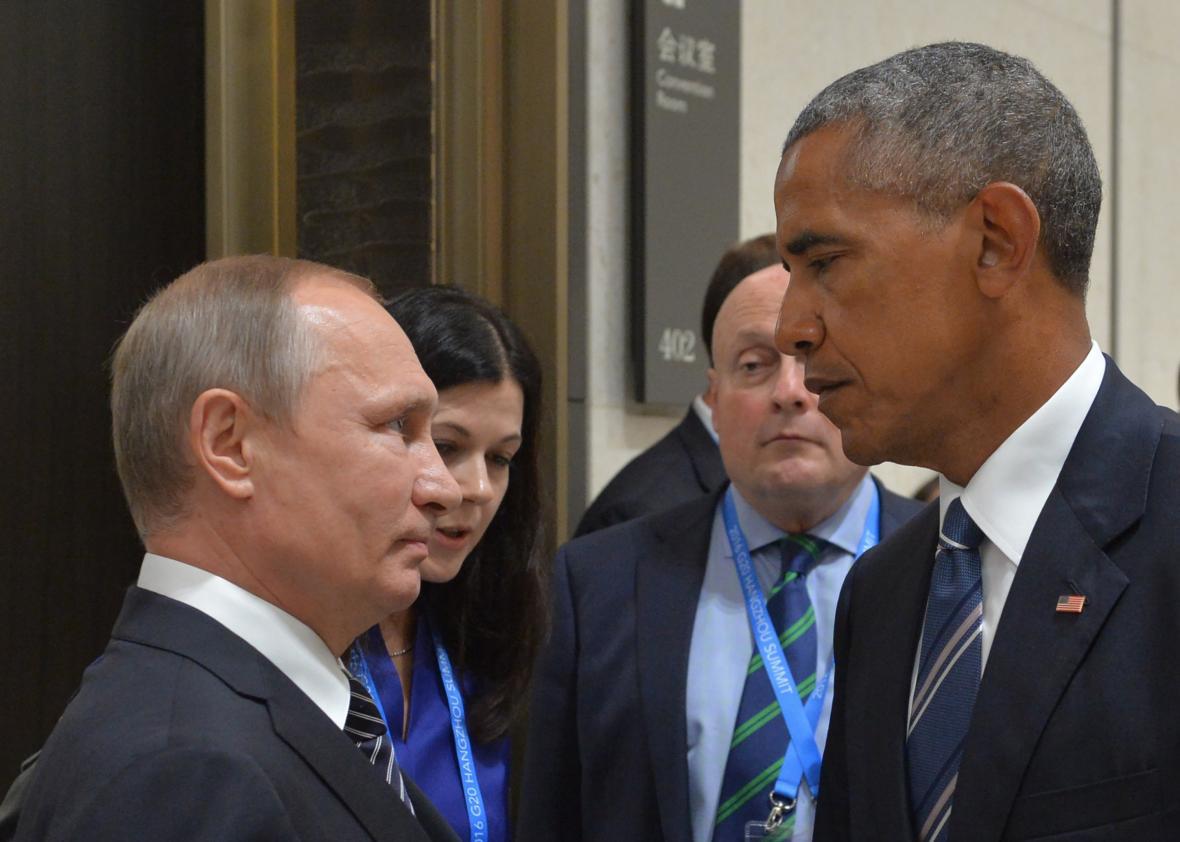President Barack Obama issued on Thursday a series of sanctions against Russia for its role in tampering in the United States presidential election through cyberattacks that worked to benefit President-elect Donald Trump.
The executive actions included several elements. The United States closed down two Russian compounds, in Maryland and New York, “used by Russian personnel for intelligence-related purposes,” Obama announced. It also expelled 35 Russian diplomats described as “Russian intelligence operatives” by the president, calling them “persona non grata” and giving them 72 hours to leave the country. The president also issued sanctions on four top Russian intelligence officials, the Russian spy agencies GRU and the FSB, and “three companies that provided material support to the GRU’s cyber operations.” The Treasury Department also issued economic sanctions against two men who were already on the FBI’s most wanted list for their alleged cybercrimes.
The New York Times reported that the sanctions against the intelligence officials were mainly symbolic, as such officials rarely conduct business in the United States or visit the country. Obama also hinted at other retaliatory gestures. “These actions are not the sum total of our response to Russia’s aggressive activities,” his announcement read. “We will continue to take a variety of actions at a time and place of our choosing, some of which will not be publicized.”
The intelligence officials expelled were removed in response to what the administration characterized as a campaign of harassment against U.S. diplomats in Russia. “The harassment has involved arbitrary police stops, physical assault, and the broadcast on State TV of personal details about our personnel that put them at risk,” State Department spokesman Mark C. Toner said in a statement reported by the Washington Post.
Vladimir Putin’s government was promising to respond to the sanctions in kind and his embassy in the United Kingdom taunted Obama as a lame duck.
The incoming president, Trump, said on Wednesday that Americans should get over Russia’s meddling in the United States election on his behalf. “I think we ought to get on with our lives,” he told reporters Wednesday. “I think that computers have complicated lives very greatly. The whole age of computer has made it where nobody knows exactly what is going on. We have speed, we have a lot of other things, but I’m not sure we have the kind, the security we need.”
On Thursday, the president-elect issued the following response:
It’s time for our country to move on to bigger and better things. Nevertheless, in the interest of our country and its great people, I will meet with leaders of the intelligence community next week in order to be updated on the facts of this situation.
Part of the reasoning for the timing of the issuance of the sanctions seemed to be to box in the incoming president. The sanctions were supported by members of his Republican Party.
Sens. John McCain and Lindsey Graham called for even stronger sanctions, in fact. “The retaliatory measures announced by the Obama administration today are long overdue. But ultimately, they are a small price for Russia to pay for its brazen attack on American democracy. We intend to lead the effort in the new Congress to impose stronger sanctions on Russia,” the Republicans said in a joint statement.
CNN reported that a senior administration official acknowledged Trump could overturn these sanctions, but said “I don’t think it’d make a lot of sense.”
The Times noted that Trump had previously suggested he might undo past sanctions:
Starting in March 2014, the United States and its Western allies levied sanctions against broad sectors of the Russian economy and blacklisted dozens of people, some of them close friends of Mr. Putin’s, after the Russian annexation of Crimea and its activities to destabilize Ukraine. Mr. Trump suggested in an interview with The New York Times earlier this year that he believed those sanctions were useless, and left open the possibility he might lift them.
The other purpose of the response was to warn Russia and other hostile foreign actors that they would face retaliation for future cyberattacks and to let them know that American intelligence services were able to monitor these efforts.
Obama’s administration expanded on an October statement blaming Russia for the hacks against the Democratic Party that resulted in embarrassing information ultimately being revealed on WikiLeaks. The FBI and Department of Homeland Security released a statement saying that the “U.S. government can confirm that the Russian government, including Russia’s civilian and military intelligence services, conducted many of the activities generally described” by a number of security companies that had previously pinned the cyber attacks on Russia.
Obama had considered issuing sanctions prior to the election but decided against it due to fear of retaliation ahead of Election Day, the Times reported. “Some of his aides now believe that was a mistake,” the paper wrote.
This post has been updated to include President-elect Trump’s response to the sanctions.
